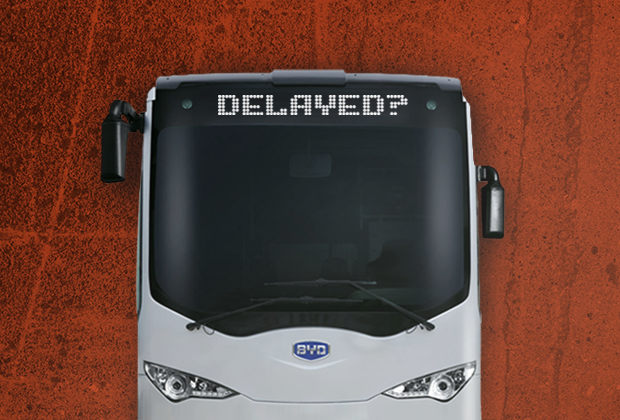The BYD Motors drama is quickly becoming the novela of the transit community in Southern California, as the bus manufacturer—via Long Beach Transit (LBT)'s Rolando Cruz—is expected to delay the delivery of LBT's electric bus fleet.
The troubled bus manufacturer, whose North American offices in Los Angeles are operated by China-based BYD, controversially scored the contract with LBT this past year over South Carolina-based Proterra; additionally this year, it also won an electric bus contract with Metro, making BYD home to the nation's two largest electric bus contracts. The controversy was rightfully raised, if not a flat-out given provided the many questions that arose in the RFP process.
"This delay in Altoona [testing] could adversely affect our deployment schedule because we have contractually agreed to not accept any buses before the Altoona testing is completed," Cruz said.
For one, Proterra's electric buses—already approved through the fed's testing program, Altoona—were already on the ground in Foothill and have since then hit the ground in San Antonio while BYD's buses hadn't even hit the line for Altoona testing. This isn't to mention the company's falsifying of who had contracted buses with them.
Then things really started to hit the fan: the recent admission at a LBT board meeting that seven of the nine subassemblies for the new fleet were not approved for use; the welding issues that were discovered in the frames and bracket installation; the cracks that were discovered near the rear of the BYD bus undergoing Altoona testing; accusations of failed promises in regard to job building and bus manufacturing in North America…
And the frosting on the curb? Two major national stories—one for the New York Times and the other for the Los Angeles Times—has uncovered that the State of California is investigating BYD for labor violations that amount to 112 citations and nearly $20K in back wage violations after it was discovered that BYD had employed Chinese nationals with a $1.50/hr wage. All this has ultimately resulted in the state fining BYD some $100K.
The most recent LBT meeting brought forth the fact that a Chinese-made bus had undergone 6,000 of the required 15,000 miles of testing at Altoona but now BYD wants the feds to test a new model. This new bus is referred to as the LBT pilot because it represents how the entire new electric fleet for LBT will be made: parts from China, assembled in US.
This means, according to Cruz, a new bus may not be seen until February or March, adding another three months given Altoona puts buses under some 150 miles of testing per day.
"This delay in Altoona [testing] could adversely affect our deployment schedule because we have contractually agreed to not accept any buses before the Altoona testing is completed," Cruz said.
FTA only wishes to test one bus so as to whether this will go through is entirely uncertain.
The implications of this very tricky situation are concerning, if not outright dire: between Metro and LBT, BYD is becoming the face of this country's approach to electric transit on a larger scale than anywhere else. Should the programs not run smoothly—such as Proterra's programs in Foothill or San Antonio, which has not seen a major, national impact due to the smallness of their fleets—the public perception of the efficiency and cost-effectiveness of electric fleets will fall by the wayside.
Read more:
- Despite Calls for Boycott, Los Angeles and Long Beach to Continue Relationship with Troubled BYD
- Uh-Oh, (More) Flaws Discovered in BYD Electric Buses
- Opinion: Metro, Don’t Make the Same Mistake Long Beach Transit Did on Electric Buses
- Houston, We Have (More) Electric Bus Problems
- BYD Accused of Labor Violations by State; Subassemblies Disapproved for Use by LBT
- Chinese Bus Company Recommended By LBT Fabricates Stats; Earnings Are "Below Expectations"







